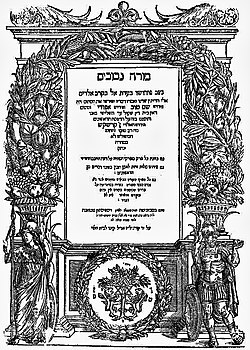
Back فلسفة يهودية Arabic فلسفه يهوديه ARZ ইহুদি দর্শন Bengali/Bangla Prederouriezh yuzev Breton Filosofia jueva Catalan Jüdische Philosophie German Juda filozofio Esperanto Filosofía judía Spanish فلسفه یهودی Persian Juutalainen filosofia Finnish
| Part of a series on |
| Jewish philosophy |
|---|
 |
| Part of a series on |
| Judaism |
|---|
   |
| Part of a series on |
| Jews and Judaism |
|---|
| Part of a series on |
| Philosophy |
|---|
Jewish philosophy (Hebrew: פילוסופיה יהודית) includes all philosophy carried out by Jews or in relation to the religion of Judaism. Until the modern Haskalah (Jewish Enlightenment) and Jewish emancipation, Jewish philosophy was preoccupied with attempts to reconcile coherent new ideas into the tradition of Rabbinic Judaism, thus organizing emergent ideas that are not necessarily Jewish into a uniquely Jewish scholastic framework and worldview. With their admission into broader modern society, Jews with secular educations embraced or developed entirely new philosophies to meet the world's demands in which they now found themselves.
Medieval rediscovery of ancient Greek philosophy among the Geonim of 10th-century Babylonian academies brought rationalist philosophy into Biblical-Talmudic Judaism. During the Geonic period, philosophy was generally in competition with Kabbalah. Both schools would become part of classic Rabbinic literature, though the decline of scholastic rationalism coincided with historical events that drew Jews to the Kabbalistic approach. For Ashkenazi Jews, emancipation and encounters with secular thought from the 18th century onwards altered how philosophy was viewed. Ashkenazi and Sephardi communities had comparatively later, more ambivalent interactions with secular cultures than those of Western Europe. In the varied responses to modernity, Jewish philosophical ideas were developed across a range of emerging religious movements. These developments could be seen as either the continuation of or breaks from the canon of Rabbinic philosophy of the Middle Ages and the other historical dialectic aspects of Jewish thought, resulting in diverse contemporary Jewish attitudes to philosophical methods.
© MMXXIII Rich X Search. We shall prevail. All rights reserved. Rich X Search